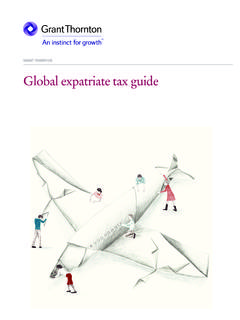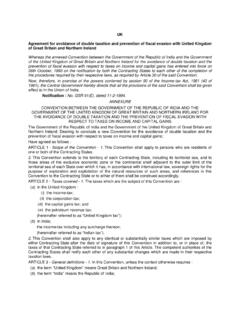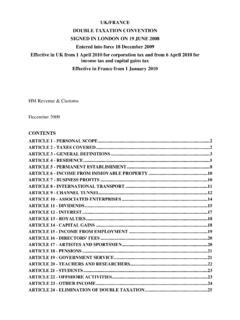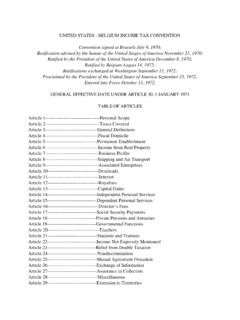Transcription of TAX CONVENTION WITH DENMARK GENERAL ... - IRS tax …
1 TAX CONVENTION WITH DENMARKGENERAL EFFECTIVE DATE UNDER ARTICLE 29: 1 JANUARY, 2001 TABLE OF ARTICLESA rticle 1------------------------------ GENERAL ScopeArticle 2------------------------------Taxes CoveredArticle 3------------------------------ GENERAL DefinitionsArticle 4------------------------------Residence Article 5------------------------------Permanent EstablishmentArticle 6------------------------------Income from Real PropertyArticle 7------------------------------Business ProfitsArticle 8------------------------------Shipping and Air TransportArticle 9------------------------------Associate d EnterprisesArticle 10-----------------------------Dividends Article 11-----------------------------InterestA rticle 12-----------------------------Royalties Article 13-----------------------------Capital GainsArticle 14-----------------------------Independe nt Personal ServicesArticle 15-----------------------------Dependent Personal ServicesArticle 16-----------------------------Directors '
2 FeesArticle 17-----------------------------Artistes and SportsmenArticle 18-----------------------------Pensions, Social Security, Annuities, Alimonyand Child Support PaymentsArticle 19------------------------------Governme nt ServiceArticle 20------------------------------Students and TraineesArticle 21------------------------------Other IncomeArticle 22------------------------------Limitati on of BenefitsArticle 23------------------------------Relief from Double TaxationArticle 24------------------------------Non-disc riminationArticle 25------------------------------Mutual Agreement ProcedureArticle 26------------------------------Exchange of InformationArticle 27------------------------------Administ rative AssistanceArticle 28------------------------------Diplomat ic Agents and Consular OfficersArticle 29------------------------------Entry into ForceArticle 30------------------------------Terminat ionProtocol----------------------------- ---of 10 August.
3 1999 The Saving Clause -----------------Paragraph 4 of Article 1 MESSAGEFROMTHE PRESIDENT OF THE UNITED STATESTRANSMITTINGCONVENTION BETWEEN THE GOVERNMENT OF THE UNITED STATES OFAMERICA AND THE GOVERNMENT OF THE kingdom OF DENMARKFOR THE AVOIDANCE OF DOUBLE TAXATION AND THE PREVENTION OFFISCAL EVASION WITH RESPECT TO TAXES ON INCOME, SIGNED ATWASHINGTON ON AUGUST 19, 1999, TOGETHER WITH A PROTOCOLLETTER OF SUBMITTALDEPARTMENT OF STATE,Washington, September 7, PRESIDENT,The White House. THE PRESIDENT: I have the honor to submit to you, with a view to its transmission to theSenate for advice and consent to ratification, the CONVENTION Between the Government of theUnited States of America and the Government of the kingdom of DENMARK for the Avoidance ofDouble Taxation and the Prevention of Fiscal Evasion with Respect to Taxes on Income, signedat Washington on August 19, 1999 ("the CONVENTION "), together with a Protocol.
4 This CONVENTION replaces the current CONVENTION between the United States of America andthe Government of the kingdom of DENMARK signed at Washington on May 6, 1948. Thisproposed CONVENTION generally follows the pattern of the Model tax treaty whileincorporating some features of the OECD Model tax treaty and recent tax treaties 'withdeveloped countries. The proposed CONVENTION provides for maximum rates of tax to be appliedto various types of income, protection from double taxation of income and exchange ofinformation. It also contains rules making its benefits unavailable to persons that are engaged intreaty shopping. Like other tax conventions, this CONVENTION provides rules specifying whenincome that arises in one of the countries and is attributable to residents of the other country maybe taxed by the country in which the income arises (the "source" country). The withholding rates on investment income under the proposed CONVENTION are the same asthose in the Model treaty .
5 Pursuant to Article 10, dividends from direct investments aresubject to tax by the source country at a rate of five percent. The ownership threshold for directinvestment is ten percent. Other dividends are generally taxable at 15 percent. Under Article 12, royalties arising in one Contracting State and owned by a resident of theother Contracting State are generally subject to taxation only by the residence country. Interest arising in one Contracting State and earned by a resident of the other ContractingState is generally subject to taxation only by the residence country under Article 11. There are exceptions to the above limitations on taxation by the source country. The sourcecountry may tax dividends, interest and royalties, if the beneficial owner of the income is aresident of one Contracting State who carries on business in the other Contracting State in whichthe income arises and, in the case of business profits, the income is attributable to a permanentestablishment or, in the case of independent personal services, to a fixed base in that other State.
6 The limitations on source country taxation of dividends, interest and royalties in thepreceding paragraphs are also subject to the standard anti-abuse rules for certain classes ofinvestment income found in recent tax treaties. The taxation of capital gains under the proposed CONVENTION generally follows the format ofthe Model. Gains derived from the sale of real property and from real property interests maybe taxed by the State in which the property is located. Likewise, gains from the sale of personalproperty pertaining to a fixed base or forming part of a permanent establishment situated in aContracting State may be taxed in that State. All other gains, including gains from the alienationof ships, boats, aircraft and containers used in inter-national traffic and gains from the sale ofstock in a corporation, are taxable only in the State of residence of the seller. As a variation fromthe rules under the Model, gains of an enterprise of a Contracting State from the deemedalienation of an installation, drilling rig or ship used in the other State for the exploration orexploitation of oil and gas resources may be taxed in that other State in accordance with its law,but only to the extent of any depreciation taken in that other State.
7 The proposed CONVENTION alsocontains accompanying provisions that serve to minimize possible double taxation that couldotherwise arise by allowing adjustments to the timing of the taxation of capital gains. Article 7 of the proposed CONVENTION follows the standard rules for taxation by the sourcecountry of the business profits of a resident of the other country. The source country's right to taxsuch profits is generally limited to cases in which the profits are attributable to a permanentestablishment located in that country. As do all recent treaties, this CONVENTION preservesthe right of the United States to impose its branch taxes in addition to the basic corporate tax on abranch's business profits. Consistent with the Model, Article 8 of the proposed CONVENTION permits only thecountry of residence to tax profits from international operation of ships or aircraft and incomefrom the use, maintenance or rental of containers used in international traffic.
8 This reciprocalexemption extends to income from the rental on a full basis of ships and aircraft and, if the shipsor aircraft are operated in international traffic by the lessee or the income is incidental to incomefrom the operation of ships and aircraft in international traffic, to income from the rental on abareboat basis of ships and aircraft. The proposed Protocol clarifies that the Scandinavian Airlines System (SAS) is a consortiumunder Article 8, which means that the profits of SAS Danmark A/S from its participation in SASare subject to the terms of Article 8, as described above. The taxation of income from the performance of personal services under Articles 14 through17 of the new CONVENTION generally follows standard treaty policy. The rules for the taxation of pension income under Article 18 of the proposed Conventionvary from the rules found in the current treaty and the Model. The proposed Conventionprovides for taxation of private pensions only in the source State, subject to an exception forpersons currently receiving pensions, who will continue to be taxed only in the country ofresidence.
9 Article 22 of the proposed CONVENTION contains comprehensive anti- treaty -shopping rulesmaking its benefits unavailable to persons engaged in treaty -shopping. These provisions aresimilar to those found in the Model treaty and all recent treaties. The proposed CONVENTION provides a foreign tax credit for certain taxes imposed under theDanish Hydrocarbon Tax Act, subject to the same type of limitation that is found in other taxtreaties with countries on the North Sea (Article 23). The proposed CONVENTION also contains rules necessary for its administration, including rulesfor the resolution of disputes under the CONVENTION (Article 25), for exchange of information(Article 26) and for assistance in the collection of taxes (Article 27). The CONVENTION would permit the GENERAL Accounting Office and the tax-writing committeesof Congress to obtain access to certain tax information exchanged under the CONVENTION for usein their oversight of the administration of domestic tax laws.
10 In accordance with the provisions of Article 29, the proposed CONVENTION will enter intoforce when the Governments notify each other that their requirements for entry into force havebeen met. It will have effect, with respect to taxes withheld at the source, for amounts paid orcredited on or after the first day of the second month next following the date on which theConvention enters into force; with respect to other taxes, the CONVENTION will take effect fortaxable periods beginning, on or after the first day of January next following the date on whichthe CONVENTION enters into force. Where the current CONVENTION would have provided greaterrelief from tax than the proposed CONVENTION , the current CONVENTION will continue to have effectfor an additional year at the election of any person that was entitled to benefits under the currentconvention. The proposed CONVENTION will remain in force indefinitely unless terminated by one of theContracting States, pursuant to Article 30.














